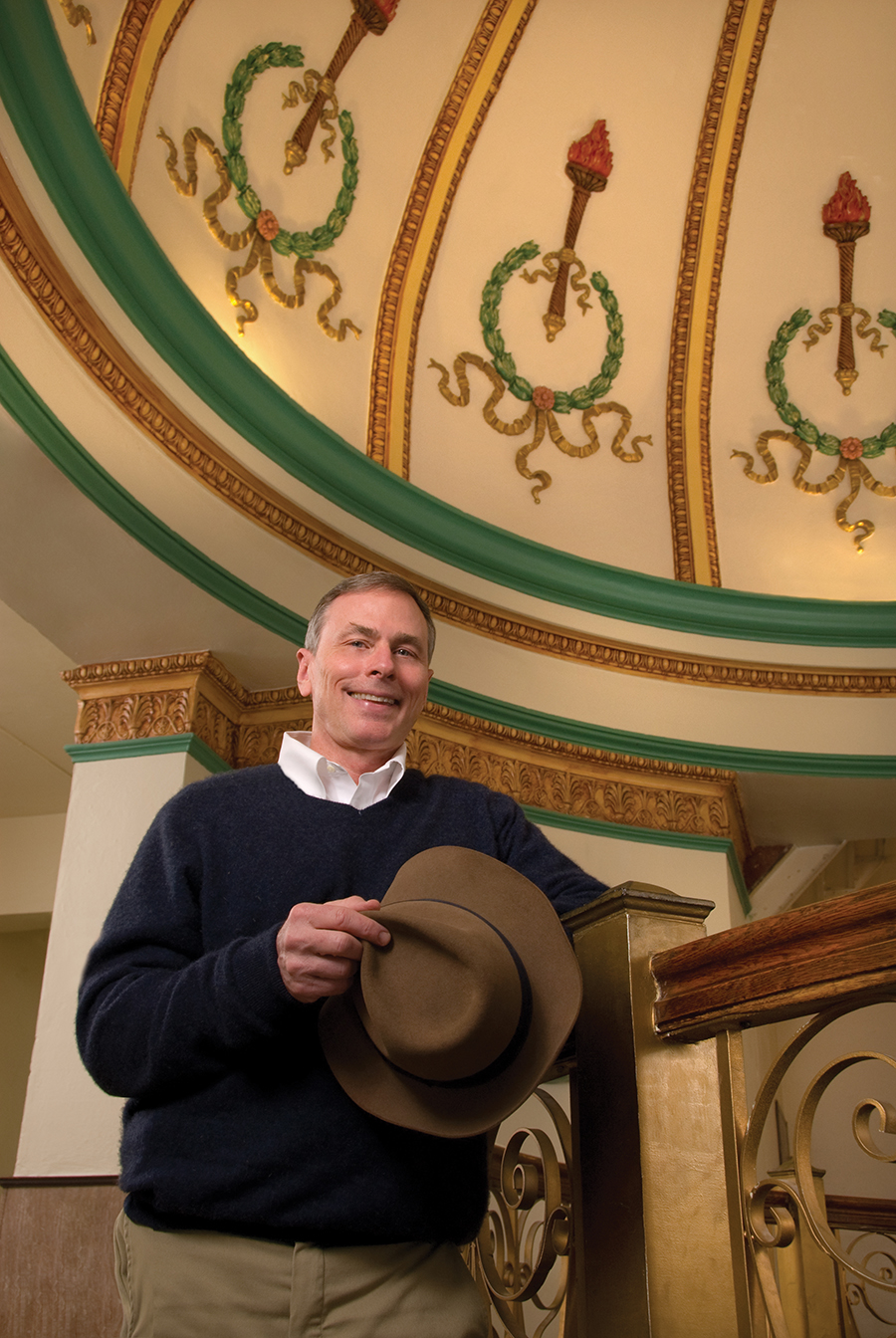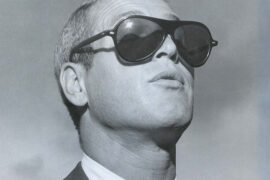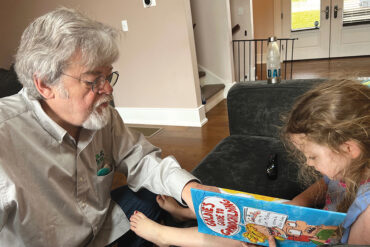Chess champion, wine connoisseur, bee keeper, technology wizard, power broker and highly-respected judge are some of the many hats Dan O’Hanlon wears as one of Huntington’s most colorful & talented citizens.
By John Gillespie
HQ 64 | WINTER/SPRING 2008
He earned the Governor’s Technology Award in 1999. He was named the Active Partners in Educational Excellence Winner in 2005. And last year he was voted “Judge of the Year” by the West Virginia Association for Justice, becoming the first Huntington judge to be selected. While the awards continue to pile up for The Honorable Judge Dan O’Hanlon, he thinks that recognition is gratifying, and it confirms to him that he has made the right decisions in his life.
“Honors are great,” he says during a recent snowy winter day from his chambers. “It’s recognition that you have made a difference – that you left someplace better than you found it.”
It has been 10 years since Dan O’Hanlon was first profiled by the Huntington Quarterly in an article entitled “Renaissance Man.” Since then the multi-faceted judge has continued to make a profound impact on the community he now calls home. He is very well thought of not only in Huntington, but throughout the state. In fact, during secret midnight ceremonies to ensure the continuity of state government, he has sworn in both Gov. Bob Wise and Gov. Joe Manchin. “It’s a real honor to be asked by two different governors to do that.”
“Judge O’Hanlon has been a revered public servant and one of our state’s most respected jurists for many years,” notes Manchin. “The people of Cabell County and West Virginia are fortunate to have someone with his knowledge and dedication to fairness on the bench. His work to use technology in the courtroom has saved West Virginians millions of dollars and greatly improved the efficiency of our criminal justice system. He is an asset to all of West Virginia, and I’m honored to have worked with him, and to have had him swear me in.”
Tracing back to a tragic loss 30 years ago, O’Hanlon says he was faced with a tough decision and now knows that he made a good choice. The death of his father in 1978 caused O’Hanlon to sit down and think about what he wanted from the rest of his own life.
“You better figure out what you are about every day. You don’t have forever to make a difference,” he says. “I wanted to find a place where I could make a difference. I was just turning 30 and looking back this is exactly where I needed to be.”
It was Marshall University and the offer to start the Paralegal Training Program there that lured O’Hanlon to Huntington. He stayed at MU until 1984.
“It was a wonderful way to come into the community. The folks in the Marshall community were very open and pleasant to work with and made me feel right at home.”
O’Hanlon pointed out that he and Dr. Stephen Kopp, President of Marshall University, attended the same high school – Lyons Township High School in LaGrange, Ill. Both men came to Huntington to work at Marshall University.
Dr. Kopp says that he and O’Hanlon were amused when they found out about having the same high school.
“When Judge O’Hanlon and I first met and discovered our connection to LTHS, we shared a laugh, some memories and then our amazement about how we both found our way to Huntington, West Virginia,” Kopp says.
Both Kopp and O’Hanlon attended the Illinois high school in the late 1960s. They were three years apart and did not know each other as teenagers. O’Hanlon graduated from LTHS in 1966. Kopp enrolled the next year.
“I know that Judge O’Hanlon is highly respected as a Cabell County Circuit Court Judge and has been for many years,” Kopp said. “It stands to reason that fellow graduates of Lyons Township would be very proud of his accomplishments.”
After high school, O’Hanlon went on to earn his bachelor’s degree at Marquette University in 1970 and his law degree with honors from Arizona State University in 1973.
Reflecting on his decision to move to the Mountain State, O’Hanlon says he is glad he made the choice to do so.
“Nobody could have predicted when I moved to Huntington in summer 1978 where I would be today,” he says. “Good things have happened and I am very grateful for that.”

O’Hanlon names former St. Mary’s Medical Center C.E.O Tom Jones, civic leader Mike Perry, and businessmen Marshall Reynolds and Robert Shell as mentors. Not surprising, O’Hanlon says he enjoys serving as a mentor to younger people who seek him out for advice.
“When younger people come to me, I hope I do for them what these men did for me,” he says. “All you can really do is pass it on to the next generation coming along.”
Robert Shell, president of Guyan International and Chairman of the Marshall University Board of Governors, says that he has turned to O’Hanlon for advice as well.
“It goes both ways,” Shell says. “He’s got enormous experience with people and situations. When a conflict with people arises, he often gives good advice.”
Shell recalls that during a project to establish a computer lab at Kellogg Elementary in Huntington’s West End that O’Hanlon kept asking him what he thought about different types of technology.
“What I was interested in was that the kids would be able to use the computers effectively,” Shell says. “I’ve never turned on a computer in my life. Dan came in and did know about this stuff.”
Although Shell says he got a lot of credit for the project, he says O’Hanlon was the “real brains” behind the effort.
When talking with O’Hanlon, choices and decision-making enter the conversation at different times.
As a Cabell County Circuit Court Judge since 1985, O’Hanlon has told people facing him in his courtroom that they did not get to where they were “by making one bad decision, but hundreds and thousands of bad decisions.”
And it takes more than one good decision for a person to get back on track. “You have to make good decisions every hour and every day to get yourself back to even,” he says. “If you continue to make bad decisions then you will continue to face bad consequences. I’ve made a lot more good decisions in my life than bad decisions or I wouldn’t be so blessed.”
O’Hanlon says there is no question that the increase in drug crimes in Huntington has been the biggest change in the past 10 years. “Drugs have left the big cities and come to cities the size of Huntington,” he says.
The majority of O’Hanlon’s time is spent on adult and juvenile criminal cases, as well as on cases where parents have abused or neglected their children. Drug crimes increase other crimes in the area, he says. “The amount of drugs in Huntington and the amount of drug crimes add to more crime including breaking and entering, purse snatching, forgery and credit card fraud,” he says.
While drug crimes have to be treated like other crimes, O’Hanlon says it is important to address someone’s addiction to drugs while the court system has them under its control. Helping people break their addictions can “prevent hundreds and thousands of future victims from having to experience crime,” he says. “I’m all for locking people up, but if we don’t change them and let them back into society, then we have not done everything you can do to protect society.”
O’Hanlon says the state of West Virginia is doing a good job and devoting a large amount of resources to addressing the problems of juvenile offenders.
“West Virginia is one of the states that understands that kids make mistakes. We do a remarkable job with kids in the community.”
Understanding that people facing charges are at their lowest point, O’Hanlon says it’s not his job to add to their problems the way some TV judges like to do. “When people come to see me, they are in crisis. You are seeing them at the worst moment in their lives,” he says.
Sometimes people need to be incarcerated in order to help them sort out their problems, O’Hanlon says. But, he has worked hard to come up with other options such as home confinement in which offenders pay for their own confinement and the Day Report Center where people with addictions can see therapists.
The number of police officers available to fight crime definitely plays a role, O’Hanlon says. “When I was a Municipal Judge in Huntington in the early 1980s, there were between 115 and 120 Huntington police officers.
Now, there are between 85 and 90,” he says. “You have to think of the police force as the immune system in the community. If your immune system is weakened, you are going to be attacked.”
While realizing that Huntington’s population is lower than it was in the 1980s, O’Hanlon has an idea that he thinks can help. His idea is for a Metro Police Force that would allow the Cabell County Sheriff’s Department, the Huntington Police Department, the Barboursville Police, Milton Police and West Virginia State Police to work together to respond to the needs of the entire community. “It would be a great first step,” he says. “Mike Perry likes to say that you have to date and dance together a little bit before you get married. The Metro Police Force would allow law enforcement to get used to working together.”
Despite the increase of drug crimes in Huntington, O’Hanlon thinks the city is on the right track economically. “I feel like Huntington has finally turned the corner and everyone is pulling in the same direction,” he says. “I believe the development of downtown will be a cornerstone for positive things happening in our community.”
The people of Huntington earn high praise from the longtime judge.
“Huntington is the nicest place I have ever lived in my life,” he says. “You won’t find nicer and more generous people in the world than what you’ll find in Huntington, West Virginia.”
Opportunities to leave the area have arisen, but O’Hanlon is adamant that he and his wife, Kathy, have made the right choice in staying.
Says Dan: “Since 1978, my wife and I have had four opportunities to leave. At each point, what we saw here was better than anywhere else. We’ve stayed and we’re glad that we stayed.”
O’Hanlon is proud of the accomplishments of his wife, Kathy, who is a family practice physician and full professor with the Marshall University School of Medicine. “I am very proud of her. We just celebrated our 32nd wedding anniversary. Our skills, interests and talents are very complementary.”
Mike Perry, former C.E.O. of KeyCenturion Bancshares and former President of Marshall University, says Dan and Kathy make a great team. “He’s a very smart man who is not afraid of hard work. However, the smartest thing he ever did was marry Kathy as the two of them are something very special and tremendous assets to our community in so many ways,” Perry says.
O’Hanlon jokes that people like to work with his wife professionally. “I think Kathy has developed a group of patients who really like seeing her. That’s the exact opposite of my job, where people hate to come to see me professionally.”
At the end of this year, O’Hanlon will have completed 24 years as Cabell County Circuit Court Judge. At one point he had thought of retiring, but he has now decided to seek a fourth, eight-year term. He is running unopposed. “If I remember to get up and vote, then I’ll win,” he says.
Having given retirement careful consideration, O’Hanlon says he is ready for eight more years of service. “I was 36 when elected. I will be 60 this May. I’m staying. It feels right to me. It’s a great honor that I have been elected over and over again by the people of this community. I’ve been welcomed with open arms and I’ve worked to give back.”
Some of the boards and committees that O’Hanlon has served on include Founding Board of Directors for Huntington Area Food Bank, Governor’s Committee on Child Abuse and Neglect, Board of Directors for Branches Domestic Violence Shelter and Board of Directors of Family Resource Network, among many, many others.
“You make time to give back to the community by serving on boards,” he says. “If you look at my resume, you will see that my board memberships have been as an initiator not as a maintainer. Branches Domestic Violence Shelter is one example of getting something up and running.”
O’Hanlon also wrote the corporate paperwork and charters for area food banks during his board membership with the Huntington Area Food Bank. He has remained on the board of directors for the YMCA from 1992 to the present. “I think the YMCA does more good for more people in keeping the community healthy and stress free. Every part of our community is welcome at the YMCA and can be touched by the YMCA.”
Having a man of O’Hanlon’s talents and abilities in our community is a tremendous asset, says Perry. “We are very fortunate to have a judge with such an outstanding reputation for fairness and legal ability in our community, but his value to the community is far greater than his many contributions as a judge,” Perry says. “Few people have such a wide scope of so many different interests, from beekeeping, raising sheep, playing chess, wine, the list goes on and on. In each area Dan is a highly regarded expert. However, even the inclusion of these areas does not begin to adequately describe his contributions to the community. Dan’s interests include anything that benefits the growth and development of our area, and has included in-depth work in the fields of education, medicine, culture and the arts.”
Because of the stress of his job as a judge, O’Hanlon has actively sought other hobbies and ways to meet people in positive situations. “It is difficult when you are a judge to live a balanced life,” he says.
Beekeeping has become a big passion for O’Hanlon. “I’ve enjoyed keeping 40 hives of bees in seven different locations. I sell honey at the farmer’s market and at other sites such as Julian’s, Le Cook Store, and Southern States,” he says.
O’Hanlon says he enjoys the camaraderie and kindness of people he sees at the farmer’s market and with fellow beekeepers. His wife’s cheery attitude helps him keep life in perspective as well, he says, “so that he doesn’t see everything through the lens of the criminal justice system.”
In West Virginia, beekeeping is more than just a hobby. People may be surprised to learn that there are 15,000 registered beehives in West Virginia.
If you haven’t heard yet, you soon will hear that honeybees are under attack and are dying at an alarming rate. A large beekeeping conference will take place at Marshall University July 10-12. About 400 beekeepers and many experts in the field will meet to discuss what’s happening with bees, with more than 150 classes being offered, O’Hanlon says.

People should be concerned about the problem but not yet panicked, O’Hanlon says. “Everybody’s bees are in trouble in America,” he says. “One out of every three bites of food you put in your mouth is the result of the pollination work done by bees. There will be no food, no farms if there are no bees.”
No one is sure what is killing the honeybees, but there are theories. “I think with globalization, honey bees are facing diseases and pests they did not evolve with and are now expected to cope with,” O’Hanlon says.
O’Hanlon grew up in Chicago and spent summers with his mother’s family in Nebraska, where all his cousins had fair projects. When his honey won the blue ribbon at the Cabell County Fair a few years back, O’Hanlon was very proud. He also let his cousins know about his blue ribbon. “It took me 40 years longer than my cousins,” he says, pointing out that he sent pictures of his blue ribbon to his kinfolk.
In addition to his hobby of beekeeping, O’Hanlon is an accomplished chess player. His resume includes the 1993 U.S. Amateur Team Chess Championship and the 1999 and 2003 C.C.L.A. Amateur Team Postal Chess Championships.
With his talents, it should come as no surprise that O’Hanlon is a member of MENSA, the organization for people with high intelligence quotients. He was invited to join in high school, but thought it would be like bragging, so he declined. Years later, after the first chess championship in 1993, he was invited to participate in a study and was asked again to join and is now glad he did.
“It’s nice to interact with such accomplished people. What it taught me is intelligence alone is not what gets you ahead in life,” he says. “Doing the right thing and the hard thing again and again is what gets you ahead.”
That is a message he promotes to people in his courtroom about how character is created. “It’s not about how many times you get knocked down, but how many times you get back up,” he says. “How you pick yourself up and recover from mistakes makes all the difference in the end.”
Lola Fincham has worked with O’Hanlon at the courthouse since 1991. In the early 1980s, she worked with him when he was a municipal judge for the City of Huntington. Fincham says O’Hanlon is the best boss she has ever had. Even after years of working with O’Hanlon, Fincham says she is still amazed by what she jokingly calls his “scary” intelligence.
She tells the story of a Chinese couple experiencing a problem with their legal paperwork. O’Hanlon made them a lot more comfortable about the situation. “He comes out and starts talking to them in Chinese. He’s amazing,” Fincham says.
Intellect is not always the answer to a problem, O’Hanlon says. “No matter how smart you are there are always people who are smarter than you,” he says.
There are a dozen different kinds of intelligence and everyone has some exceptional form or skill, he says. “No one of us is as smart as all of us together. That’s what makes a community work. That’s what makes a nation work.”
One good idea that O’Hanlon had led to the state of West Virginia saving millions of dollars. It took seven years of hard work, but O’Hanlon turned the idea into reality. He won the Governor’s Technology Award and several national technology awards for his project on behalf of the West Virginia Supreme Court connecting all courthouses in the state with video conferencing.
His idea has saved millions of dollars in transportation costs. In addition to saving money, the program is safer for the public, he says.
The judge is also pleased that the Criminal Justice System has led the way in saving money and eliminating unnecessary layers of government.
“I think we have more government than we can afford. When West Virginia became a state 145 years ago, they were still riding horses and mules to the courthouse. There are so many layers of government that are redundant and not needed. The Criminal Justice System has led the way by eliminating 55 county jails and creating 10 regional jails. I believe there is a lot more this area could do to reduce the size of government.”
Reflecting on his accomplishments and his 30 years in Huntington, O’Hanlon says he is pleased. “I could have stayed in Chicago, worked my entire career and wondered if I had made an impact,” he says. “In Huntington I can see the difference in my own life. That I got up, came to work, had ideas and moved them forward. That is a very satisfying feeling.”
But, don’t get the idea that O’Hanlon is finished coming up with good ideas and making them realities. “There’s a lot that has been done, but there’s a lot that remains to be done,” he says.
And with that statement, one can only wonder what Judge Dan O’Hanlon will accomplish in the next 10 years and beyond.




